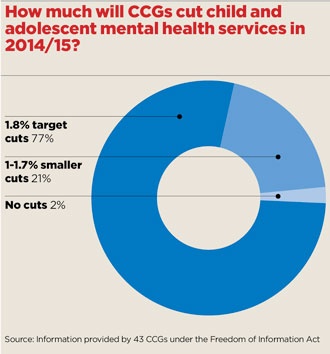Exclusive CCGs are making cuts to the funding of child and adolescent mental health services, despite concerns from GPs that services are already overstretched, a Pulse investigation has revealed.
Information obtained through a Freedom of Information request has revealed that 33 (77%) out of 43 CCGs are applying 1.8% cuts to their child and adolescent mental health services (CAMHS) budgets in 2014/15.
This is in line with NHS guidance on payments, which has stipulated CCGs should make a 20% bigger cut in mental health and other non-acute services than in acute sector services, but ministers have told Pulse that CCGs should not be bound to the efficiency target, while commissioning leads have called on CCGs to reject the guidance and invest more money into CAMHS.
GP leaders have said that practices in some areas are already frustrated by problems with trying to refer young patients for specialist help for mental health problems, and the cuts will only make this worse.
Alongside the 33 CCGs who said they were applying the 1.8% cut, a further nine said they would be making smaller cuts this year of between 1% and 1.6% and only one – NHS South Devon and Torbay CCG – confirmed it would not be making any cuts at all to its CAMHS budget this year.
CCGs making the cuts said they did not anticipate it would have any impact on frontline services.
Related stories
Analysis: Child mental health cuts to pile pressure on GPs
Mental health commissioners urge ‘radical change’ in young people’s services
Clinical casebook: child and adolescent mental health (1.5 CPD hours)
A spokesman for NHS Barnsley CCG said: ‘We are applying the tariff deflator for non-acute services of -1.8% as advised in the “Everyone Counts” planning guidance issued by NHS England.’
‘The tariff deflator is applied to the total contract values for non-acute services with the expectation that providers maintain current service levels and standards within the reduced contract value.’
However, GPs warned that the cuts would inevitably affect services.
Dr John Grenville, Derbyshire LMC secretary, said: ‘We have so many people saying our children’s health is important, mental health is important and if we don’t invest now we will pay for it in the long term. And then we have them saying “we’re going to make cuts”.’
‘Unless someone can say up front that they are absolutely certain there are 1.8% efficiency savings to be made and identify them, then what’s going to happen is we are going to see cuts in services.’

Dr Janice Allister, a GP in Peterborough and chair of the Primary Care Child Safeguarding Forum said services were patchy owing to different levels of funding and that GPs were frustrated by the restrictive referral system.
Dr Allister said: ‘It varies in different areas, partly due to funding and also, as with every specialty, CAMHS have worked out specific referral criteria and become much more fussy about what they will and won’t take, with all this triage that’s actually very frustrating for the GP to deal with.’
The latest financial squeeze comes after CAMHS services have already been hit hard by cuts as councils – which were formerly responsible for running children’s mental health – slashed their budgets over recent years, an investigation by charity Young Minds in 2012 revealed.
Care and support minister Norman Lamb told Pulse that all commissioners should be aware they do not have to abide by the national 1.8% efficiency target when negotiating local mental health contracts, which he said runs counter to the Government’s mandate to achieve ‘parity of esteem’ for mental with physical health.
He added: ‘NHS England and Monitor have… reiterated to commissioners and providers that they can be flexible in negotiations when agreeing local financial settlements by reminding them that the deflator is not a binding figure.’
As spokesperson for NHS England said: ‘There has been no central cut to mental health services. There is, however, a difference in the scale of the net efficiency target we are setting for mental health services and general acute services: -1.8% and -1.5% respectively.’
‘While the efficiency targets reduce the overall amount of money per patient head, they do not necessarily mean all providers will lose out as CCGs, who commission the majority of these services, decide how to spend their money based on local need.’
‘Investing in mental health and community services can result in fewer admissions to A&E for example, a key focus of the urgent and emergency care review.’

















